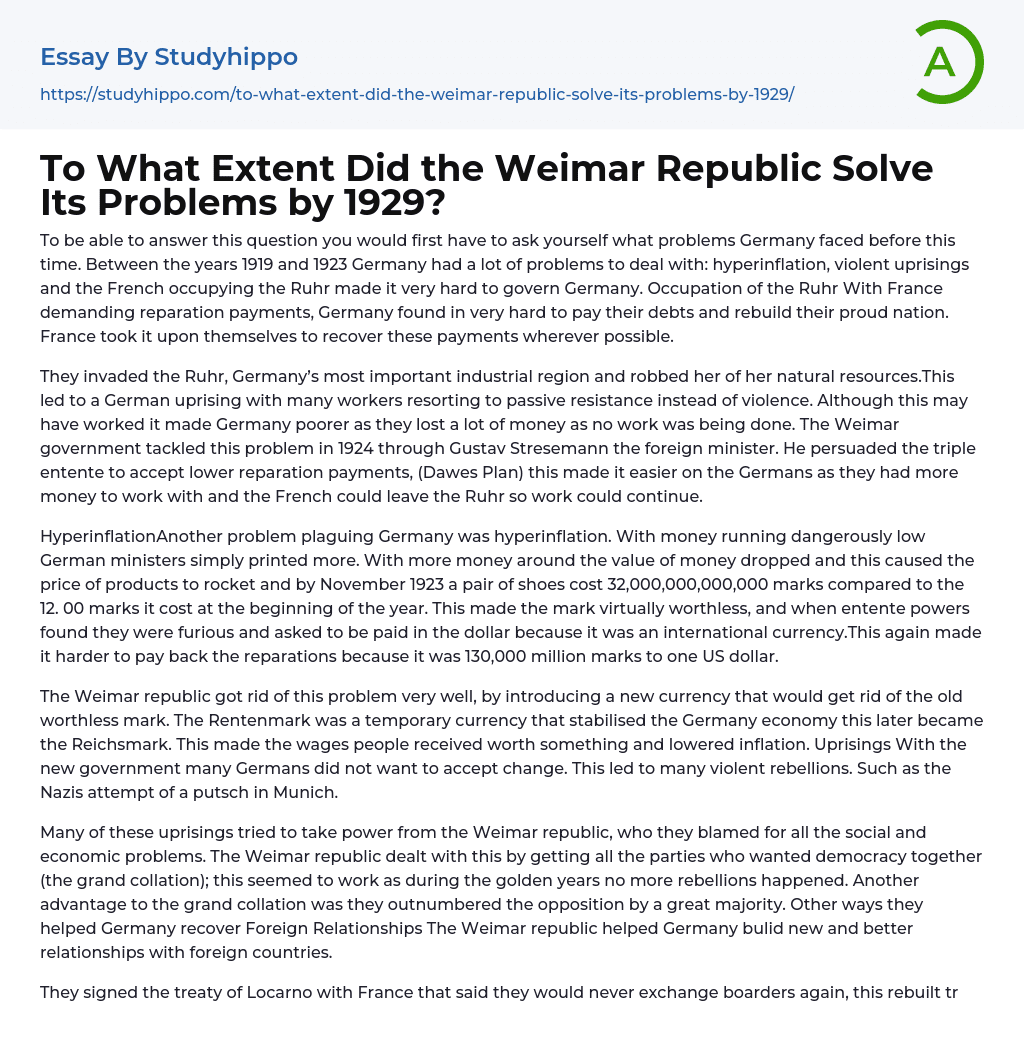

To What Extent Did the Weimar Republic Solve Its Problems by 1929? Essay Example
To be able to answer this question you would first have to ask yourself what problems Germany faced before this time. Between the years 1919 and 1923 Germany had a lot of problems to deal with: hyperinflation, violent uprisings and the French occupying the Ruhr made it very hard to govern Germany. Occupation of the Ruhr With France demanding reparation payments, Germany found in very hard to pay their debts and rebuild their proud nation. France took it upon themselves to recover these payments wherever possible.
They invaded the Ruhr, Germany’s most important industrial region and robbed her of her natural resources.This led to a German uprising with many workers resorting to passive resistance instead of violence. Although this may have worked it made Germany poorer as they lost a lot of money as no work was bei
...ng done. The Weimar government tackled this problem in 1924 through Gustav Stresemann the foreign minister. He persuaded the triple entente to accept lower reparation payments, (Dawes Plan) this made it easier on the Germans as they had more money to work with and the French could leave the Ruhr so work could continue.
HyperinflationAnother problem plaguing Germany was hyperinflation. With money running dangerously low German ministers simply printed more. With more money around the value of money dropped and this caused the price of products to rocket and by November 1923 a pair of shoes cost 32,000,000,000,000 marks compared to the 12. 00 marks it cost at the beginning of the year. This made the mark virtually worthless, and when entente powers found they were furious and asked to be paid in the dollar because it was
an international currency.This again made it harder to pay back the reparations because it was 130,000 million marks to one US dollar.
The Weimar republic got rid of this problem very well, by introducing a new currency that would get rid of the old worthless mark. The Rentenmark was a temporary currency that stabilised the Germany economy this later became the Reichsmark. This made the wages people received worth something and lowered inflation. Uprisings With the new government many Germans did not want to accept change. This led to many violent rebellions. Such as the Nazis attempt of a putsch in Munich.
Many of these uprisings tried to take power from the Weimar republic, who they blamed for all the social and economic problems. The Weimar republic dealt with this by getting all the parties who wanted democracy together (the grand collation); this seemed to work as during the golden years no more rebellions happened. Another advantage to the grand collation was they outnumbered the opposition by a great majority. Other ways they helped Germany recover Foreign Relationships The Weimar republic helped Germany bulid new and better relationships with foreign countries.
They signed the treaty of Locarno with France that said they would never exchange boarders again, this rebuilt trust between the neighbours and they were able to put the past behind themselves. The Dawes plan also opened up doors for trade between Germany and America; this boosted the German economy and the moral of the German people. With so much trade and money the German people finally had something to celebrate. This led to the opening of clubs, cafes. Again this became the main part of
people’s life. My ViewPersonally I feel the Weimar republic was a huge success and they tackled Germany’s problems with great zeal and to a great extent.
Not only did they make it a better nation economically by getting rid of the old currency but also politically by making Germany a democratic state. This took Germany to a place that it has never been before and it prospered. Not saying they solved all of Germanys problems but the ones they did they solved excellently and it showed. The most significant problem they dealt with was the economic strife and changing the currency helped Germany in the long run.
- Athens essays
- Belgium essays
- Berlin essays
- British essays
- England essays
- Germany essays
- Great britain essays
- Greece essays
- Ireland essays
- Italy essays
- London essays
- Paris essays
- Pompeii essays
- Rome essays
- Russia essays
- Spain essays
- United Kingdom essays
- Absolutism essays
- Appeal essays
- Bourgeoisie essays
- Contras essays
- Corporate Governance essays
- Corruption essays
- Democracy essays
- Democratic Party essays
- Developed Country essays
- Dictatorship essays
- Elections essays
- European Union essays
- Federalism essays
- Foreign essays
- Foreign policy essays
- Gentrification essays
- Hillary Clinton essays
- Income Tax essays
- International Relations essays
- John Marshall essays
- John Stuart Mill essays
- Left-Wing Politics essays
- Liberty essays
- Military essays
- Monarch essays
- Monarchy essays
- Political Corruption essays
- Political Party essays
- Political Science essays
- President Of The United States essays
- Public Service essays
- Red Cross essays
- Reform essays



